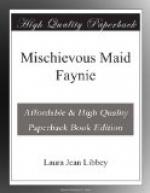Mrs. Fairfax had fallen back, trembling like an aspen leaf. She recognized her husband’s will in Faynie’s hands, and that, although the girl did not say so before the servants, she knew her treachery.
“Come, Claire, my child,” she said, turning to her daughter, “this is no place for you.”
But Claire did not stir; she stood quite still, looking from the one to the other, as though she could not fully comprehend all that she saw and heard.
By this time Kendale had recovered from his shock, and as he listened to Faynie’s recital, realized that she was not indeed a ghost, but the heiress of the Fairfax millions, and his own wife at that. And when he found his voice he cried out:
“The girl tells the truth! She is mine, and as her husband I am lord and master of this house, and of her.”
As he uttered the words he strode toward Faynie with a diabolical chuckle, and seized her slender wrists in his grasp.
“Unhand me!” shrieked Faynie, struggling frantically in his grasp, almost fainting with terror.
“No one dares interfere between man and wife,” replied Kendale, mockingly.
He did not see three dark forms spring over the threshold, thrusting the servants hastily aside.
But in less time than it takes to tell it, a strong arm thrust him aside, and a tall form sprang between him and Faynie, while a voice that struck terror to his very soul cried out:
“You have come to the end of your rope, Clinton Kendale. You have lost the game, while it was almost in your grasp!”
“Great Heaven, is it you, Lester Armstrong!” cried the guilty villain, fairly quivering with terror. “Oh, Lester, have pity—have mercy—I—”
“You shall have the same quality of mercy dealt out to you that you have meted out to others!” replied Lester, sternly.
Suddenly Kendale wrenched himself free from his grasp, crying out, hoarsely and triumphantly:
“I am game yet. I have married the girl you love. She is my lawfully wedded wife. I have lost the Marsh millions, but you are checkmated, Lester Armstrong. I have the Fairfax fortune, and your Faynie!”
“Don’t delude yourself into believing so prettily an arranged scheme,” exclaimed a voice from the doorway, and a woman whom Kendale had not noticed among the crowd before glided hastily forward, threw back her veil, confronting the villain.
“Gertrude!” he cried aghast, staggering back.
“Yes, Gertrude, your wife,” she replied. “Your wife, though you tried hard to induce me to go to Dakota and secure a divorce from you. I had instituted it and would soon have obtained it had I not read in the papers of the great fortune you had fallen into, for you had told me your cousin Lester Armstrong was dead, and you were to take his name and place as assistant cashier—no one knowing of his death, and you could easily pass yourself off for him owing to your wonderful resemblance to each other.




